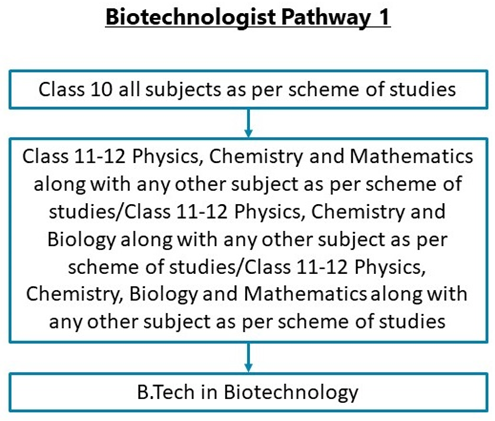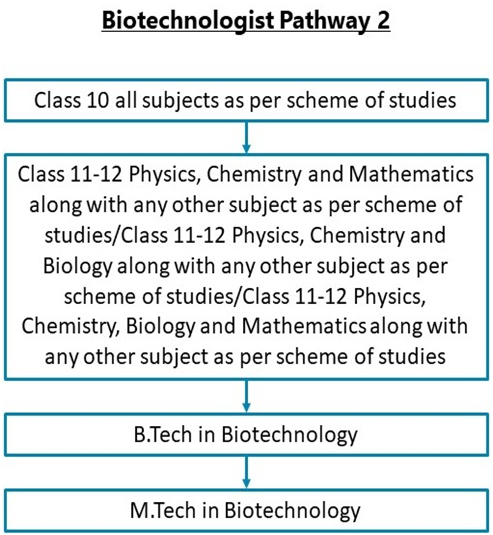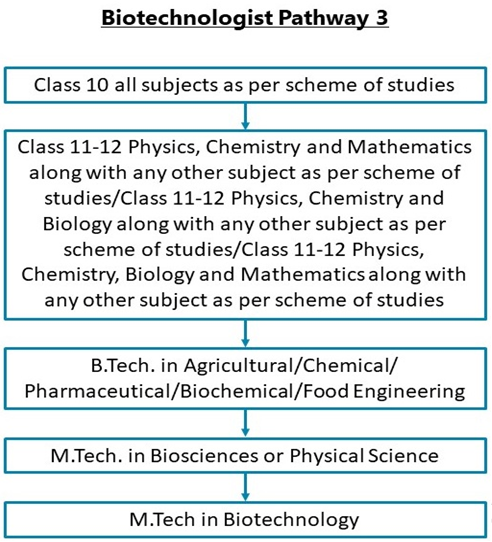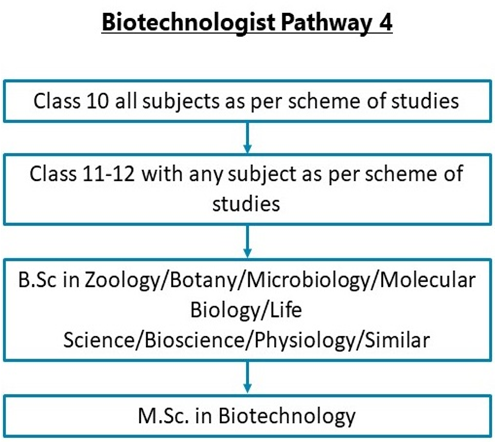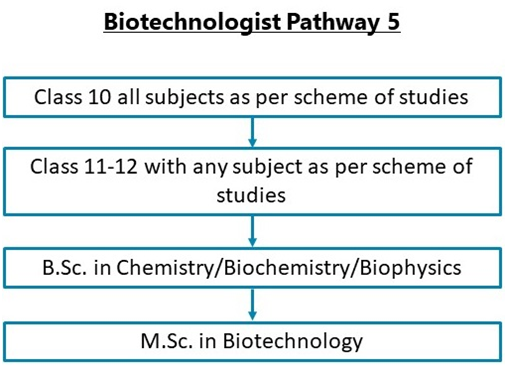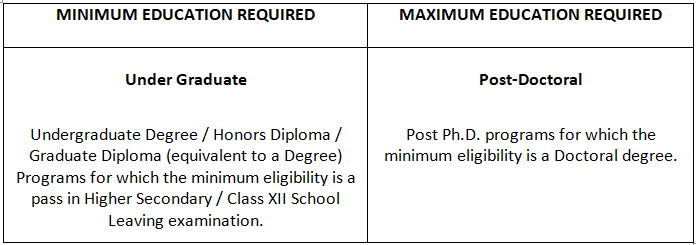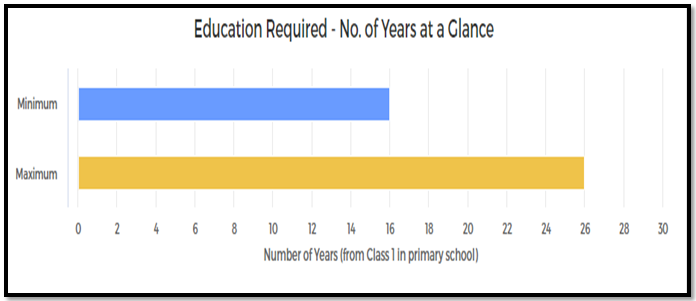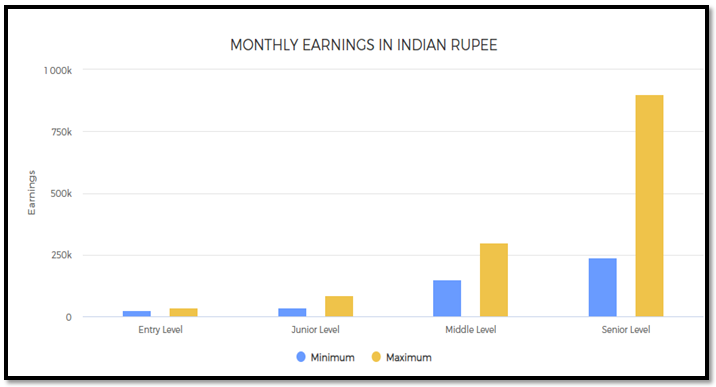Biotechnologist
Entry Level Qualification
Graduate
Career Fields
Medical Services
For Specially Abled








Career Entrance Exam
About Career
As a Biotechnologist, your primary job responsibility will be working with organic and living matter. You will have to study the cellular, molecular and genetic structure of plants, animals, and microorganisms to engineer them in ways that can be beneficial for the humans, animals and plants. You will have to understand the natural biological processes at the cellular and molecular levels to create and engineer advanced products for agriculture, food, pharmaceuticals, healthcare, and other industries as well as for protection and conservation of the flora and fauna of earth.
Biotechnologists aim to understand and manipulate the basic building blocks of living things to change their characteristics and functions. For this, they study the physical, chemical, and genetic structures as well as the biochemical processes of cells, tissues, and organisms. They modify the structures and manipulate the processes to create a product, better crop yield, produce a drug, or provide a cure from disease.
Key Roles & Responsibilities:
1. Study the genetic makeup of plants, animals, humans, and microorganisms (bacteria, fungi, yeast, etc.,) and their enzymes.
2. Collect, study, and test samples such as blood, cells, tissues, bacteria cultures, etc.
3. Design and implement research studies and develop new research procedures.
4. Set up laboratory equipment to conduct and monitor experiments.
5. Record all the findings from researches and experiments and analyze the results carefully.
6. Meet with clients, colleagues and others from time to time to discuss projects, challenges faced, and offer actionable solutions using biotechnology.
7. Plan project budgets and production costs, and find ways to secure funding.
8. Participate in intellectual negotiations with fellow researchers, academicians, clients, and so on.
PARTICULARS | DESCRIPTION |
Name | Biotechnologist |
Purpose | Processes For Agriculture, Medicine |
Career Field | Mathematics & Science |
Required Entrance Exam | No Entrance Exam |
Average Salary | 400000 - 600000 Rs. Per Year |
Companies For You | GSK, Biocon, Bharat Biotech & Many More |
Who is Eligible | Post Graduate |
Career Entry Pathway
Class 10 all subjects as per scheme of studies - Class 11-12 Physics, Chemistry and Mathematics along with any other subject as per scheme of studies/Class 11-12 Physics, Chemistry and Biology along with any other subject as per scheme of studies/Class 11-12 Physics, Chemistry, Biology and Mathematics along with any other subject as per scheme of studies- B.Tech in Biotechnology
After completing Class 10 all subjects as per scheme of studies, and Class 11-12 Physics, Chemistry and Mathematics along with any other subject as per scheme of studies/Class 11-12 Physics, Chemistry and Biology along with any other subject as per scheme of studies/Class 11-12 Physics, Chemistry, Biology and Mathematics along with any other subject as per scheme of studies. Following this, you can take up B.Tech in Biotechnology for your graduate level studies.
Class 10 all subjects as per scheme of studies - Class 11-12 Physics, Chemistry and Mathematics along with any other subject as per scheme of studies/Class 11-12 Physics, Chemistry and Biology along with any other subject as per scheme of studies/Class 11-12 Physics, Chemistry, Biology and Mathematics along with any other subject as per scheme of studies - B.Tech. in Biotechnology - M.Tech. in Biotechnology
After completing Class 10 all subjects as per scheme of studies, and Class 11-12 Physics, Chemistry and Mathematics along with any other subject as per scheme of studies/Class 11-12 Physics, Chemistry and Biology along with any other subject as per scheme of studies/Class 11-12 Physics, Chemistry, Biology and Mathematics along with any other subject as per scheme of studies. Following this, you can take complete your graduation with a B.Tech. in Biotechnology and then do an M.Tech. in Biotechnology.
Class 10 all subjects as per scheme of studies - Class 11-12 Physics, Chemistry and Mathematics along with any other subject as per scheme of studies/Class 11-12 Physics, Chemistry and Biology along with any other subject as per scheme of studies/Class 11-12 Physics, Chemistry, Biology and Mathematics along with any other subject as per scheme of studies- B.Tech. in Agricultural/Chemical/Pharmaceutical/Biochemical/Food Engineering - M.Tech. in Biosciences or Physical Science - M.Tech in Biotechnology
After completing Class 10 all subjects as per scheme of studies, and Class 11-12 Physics, Chemistry and Mathematics along with any other subject as per scheme of studies/Class 11-12 Physics, Chemistry and Biology along with any other subject as per scheme of studies/Class 11-12 Physics, Chemistry, Biology and Mathematics along with any other subject as per scheme of studies. Then you can complete your graduation with a B.Tech. degree in Agricultural Chemical/Pharmaceutical/Biochemical/Food Engineering and follow it up with an M.Tech.in Biotechnology
Class 10 all subjects as per scheme of studies - Class 11-12 with any subject as per scheme of studies-B.Sc. in Zoology /Botany/ Microbiology /MolecularBiology /Life Science/Bioscience/Physiology/Similar - M.Sc. in Biotechnology
After completing your Class 10 all subjects as per scheme of studies and Class 11-12 with any subject as per scheme of studies. Then you can complete your graduation with a B.Sc. degree in Zoology/Botany/Microbiology/Molecular Biology/Life Science/Bioscience/Physiology/related fields and follow it up with an M.Sc. in Biotechnology.
Class 10 all subjects as per scheme of studies - Class 11-12 with any subject as per scheme of studies - B.Sc. in Chemistry/Biochemistry/Biophysics - M.Sc. in Biotechnology
After completing your Class 10 all subjects as per scheme of studies and Class 11-12 with any subject as per scheme of studies. Then you can complete your graduation with a B.Sc. degree in Chemistry/Biochemistry/Biophysics and follow it up with an M.Sc. in Biotechnology.
Required Qualification & Competencies
Remember that as Biotechnology is a multi-disciplinary field, it is not always necessary to study for a degree in Biotechnology to build a career in Biotechnology. For example, in research and development of Biotechnology, knowledge of various disciplines such as Biophysics, Biochemistry, Moledulcar Biology, Cell Biology, Genetics, etc. are used. In Biotechnology products development and manufacturing industry, Chemical or Biochemical Engineerings may find work. Food Engineers may find work.
Undergraduate studies after school:
1. Keeping Science as your field of study, you can pursue your graduation with a B.Sc degree in Physics / Chemistry / Biology / Zoology / Botany / Microbiology / Molecular Biology / Biochemistry / Life Science / Bioscience / Physiology / Biophysics / Biochemistry / Agricultural Science / Food Science & Technology / Animal Sciences / Plant Sciences / Biotechnology / Plant Biotechnology / Animal Biotechnology / Marine Biotechnology or a B.Tech degree in Biotechnology / Chemical Engineering / Biochemical Engineering / Food Engineering / Pharmaceutical Technology / Agricultural Engineering / a similar field.
2. For B.Tech. You will need to have studied class 11-12 with Physics, Chemistry, Mathematics and Biology. For B.Sc. degrees in Biosciences or Biotechnology, you may study Physics, Chemistry and Biology in class 11-12.
3. You may also do an MBBS, B.Pharm. or a B.Sc. in Veterinary Science & Animal Husbandry after your class 11-12 with Physics, Chemistry and Biology.
Post Graduate studies:
1. For your post-graduation, you can choose to obtain an M.Sc degree in Physics / Chemistry / Biology / Zoology / Botany / Microbiology / Molecular Biology / Biochemistry / Life Science / Bioscience / Physiology / Biophysics / Agriculture / Agricultural Science / Food Science & Technology / Animal Sciences / Plant Sciences / Biotechnology / Animal Biotechnology / Plant Biotechnology / Marine Biotechnology / Agricultural Biotechnology / Microbial Biotechnology / Plant Breeding & Genetics / Animal Breeding & Genetics / Genetics / Molecular Biology / Cell Biology / Similar field (if you have done a B.Sc.) or an M.tech degree in Biotechnology / Chemical Engineering / Pharmaceutical Technology / Biochemical Engineering / Food Engineering / Agricultural Engineering or a similar field (if you have done a B.Tech. or a B.Pharm. B.Pharm. graduates are eligible for studying M.Tech. in Biotechnology / Pharmaceutical Technology).
2. You may also do an M.Sc. or a Master's in Veterinary Sciences with specialisation in Animal Biotechnology. Or, you can do an M.D. in a medical discipline of your choice.
Doctoral Studies:
1. After obtaining your graduate and postgraduate degrees, to develop a rewarding career in Biotechnology, you you should do a Ph.D. in Biotechnology / Biochemical Engineering and Biotechnology / Animal Biotechnology / Plant Biotechnology / Pharmaceutical Biotechnology / Medical Biotechnology / Genetics / Molecular Biology / Cell Biology / Genomics / Microbial Biotechnology / in a similar field.
2. If you have done an MBBS in the graduate level, you can directly join a Ph.D. program in a suitable field of Biotech, such as Medical or Pharmaceutical Biotechnology.
3. You have done an MD, then also you can join a Ph.D. program in Medical Biotechnology. You may also join an M.S.T.P. (Medical Scientist Training Program) in USA which prepares you to work in high end futuristic research in various areas. You may choose to do an M.S.T.P. in Medical Biotechnology.
Compentencies Required
Interests
1. Investigative: You should have interests for Investigative Occupations. Investigative occupations involve working with ideas and quite a lot of thinking, often abstract or conceptual thinking. These involve learning about facts and figures; involve use of data analysis, assessment of situations, decision making and problem solving.
2. Realistic: You should have interests for Realistic Occupations. Realistic occupations involve more practical and hands-on activities than paperwork or office work. Realistic occupations often involve physical activities for getting things done using various tools and equipment.
Abilities
1. Abstract Reasoning: The ability to understand ideas which are not expressed in words or numbers; the ability to understand concepts which are not clearly expressed verbally or otherwise.
2. Deductive Reasoning: The ability to apply general rules and common logic to specific problems to produce answers that are logical and make sense. For example, understanding the reasons behind an event or a situation using general rules and common logic.
3. Flexibility of Closure: The ability to identify or detect a pattern (a figure, object, word, or sound) that is hidden among other distracting materials.
4. Inductive Reasoning: The ability to combine pieces of information from various sources, concepts, and theories to form general rules or conclusions. For example, analysing various events or situations to come out with a set of rules or conclusions.
5. Inter-Personal: The ability to build and maintain good relationships with others at workplaces and elsewhere.
6. Naturalistic Intelligence: The ability to recognise different flora and fauna of the world; sensitivity towards nature and natural surrounding; sensitivity towards the needs of different flora and fauna.
7. Verbal Reasoning: The ability to think and reason with words; the ability to reason out ideas expressed in words.
8. Written Comprehension: The ability to read and understand information and ideas presented in writing.
Knowledge
Biological Sciences: Knowledge of plants and animals, their anatomical structure, cell structure, tissues, physiological functions, evolution, and all other related aspects.
Skills
1. Active Learning: Focused and continuous learning from various sources of information, observation and otherwise for application in getting work done.
2. Communication in English:Skills in communicating effectively in writing as well as verbally with others in English language.
3. Coordination: Skills in working together with other people to get things done.
4. Critical Thinking: Skills in analysis of complex situations, using of logic and reasoning to understand the situations and take appropriate actions or make interpretations and inferences.
5. Judgment and Decision Making: Skills in considering pros and cons of various decision alternatives; considering costs and benefits; taking appropriate and suitable decisions.
6. Problem Solving: Skills in analysis and understanding of problems, evaluating various options to solve the problems and using the best option to solve the problems.
7. Reading Comprehension: Skills in understanding written sentences and paragraphs in work related documents.
8. Scientific: Skills in using various scientific rules and methods to get things done or solve problems.
Personality
1. You are somewhat organised in your day-to-day life and activities.
2. You are somewhat careful about your actions and behaviour.
3. You are imaginative sometimes.
4. You prefer to experience new things and have new experiences sometimes.
5. You act independently sometimes but do not do so in some other times.
6. You are always practical or in most situations.
Career - Job Opportunities & Profiles
1. After B.Tech. in Biotechnology or a related field, you can get entry-level jobs roles (related to manufacturing and administrative roles) in various industries including Pharma/Biochemical/Cosmetics/Agro-based/Food production companies such as Sales Executive, Production Executive, Laboratory Assistant, QA Analysts, to name a few.
2. After M.Tech.in Biotechnology or a related field, you can get into Biotech research with job roles like Research Assistant/Associate or Research Fellow in various universities and research institutions as well as in the numerous Biotech Companies in India like Biocon, Panacea Biotec Ltd., Wockhardt, GSK Pharmaceuticals, Dr. Reddy’s Laboratories, etc.
If you hold a Ph.D. degree in the above-mentioned fields, you can bag the job roles such as a Post-Doctoral Research Fellow or a Junior Scientist in a scientific research institute or in a university in the country such as:
1. Institute of Life Sciences (Bhubaneswar)
2. Institute for Stem Cell Biology and Regenerative Medicine (Bengaluru)
3. National Institute of Animal Biotechnology (Hyderabad)
4. National Institute of Biomedical Genomics (Kalyani)
5. National Institute of Plant Genome Research (New Delhi)
6. Rajiv Gandhi Centre for Biotechnology (Thiruvananthapuram)
7. Regional Centre for Biotechnology, Centre for Cellular and Molecular Biology (Hyderabad)
8. Indian Institute of Science
9. IITs
Work Environment
The working environments of Biotechnologists may vary according to their projects and job responsibilities. They may either work in laboratories or offices and they may also sometimes have to work in manufacturing plants/factories of companies. In such cases, they may have to work in hazardous environments. Also, if they are in academic roles, they may work in laboratories/offices/classrooms of universities or research organizations. Although Biotechnologists have normal working hours, sometimes they may have to work extra hours if it involves meeting deadlines or completing experiments.
Specialisation Tracks In This Career
Medical Biotechnologist
Medical Biotechnology primarily involves the use of living cells and cell materials to formulate and produce pharmaceutical drugs, vaccines, and diagnostic products for the treatment and prevention of human diseases.
Agricultural Biotechnologist
Agricultural Biotechnology involves the use of modern scientific tools and procedures such as genetic engineering, molecular markers, molecular diagnostics, vaccines, and tissue culture, to modify, enhance, and transform plants, microorganisms, and animals.
Industrial Biotechnologist
Industrial Biotechnology involves the application of Biotechnological processes and techniques to promote sustainable processing and production of bioenergy, chemicals, pharmaceuticals, and various other industrial products. Industrial Biotechnologists seek to find alternative sources to our natural resources and use them in the industrial production process.
Food Biotechnologist
Food Biotechnology focuses on modifying or tweaking the genetic structure of our primary food sources - plants and animals. By applying the techniques of Biotechnology to plants, animals, and microorganisms, scientists aim to create new species which have desired production, marketing, or nutrition related properties. Such food products are called genetically engineered (GE) foods.
Marine Biotechnologist
Marine biotechnology, also known as “Blue Biotechnology” focuses on exploiting the diversity of the marine environment and organisms to develop various products (pharmaceuticals, cosmetics, food, fuel, etc.).
Pharmaceutical Biotechnologist
Pharmaceutical Biotechnology is exclusively dedicated to designing and developing new therapeutic ad biological drugs, diagnostic agents for medical tests, and also gene therapy to correct the medical symptoms of hereditary diseases.
Environmental Biotechnologist
Essentially, Nanobiotechnology is the amalgamation of nanotechnology and biology. With the help of this collaboration, scientists are able to imagine and develop pioneering systems such as nanodevices and nanoparticles that can be invaluable for biological research.
Plant Biotechnologist
Plant Biotechnology is a collection of techniques and procedures used to create and develop new varieties of plants to cater to specific needs. With these techniques, researchers can detect and map genes, identify/discover their functions, delineate specific genes for genetic resources and breeding, and transfer genes into plants for developing specific traits.
Animal Biotechnologist
Animal biotechnology uses molecular biology techniques to genetically engineer (modify/enhance genomes) animals to boost their efficacy and suitability for pharmaceutical, industrial, and agricultural applications.
Genetics
Genetics exclusively deals in the study of the DNA, genes, and genomes (including biotechnology, molecular genetics, genomics, and bioinformatics). Also, it studies the level of organisms (Mendelian genetics) and genetic variety and hereditary traits in organisms.
Genomics
Genomics centers around measuring and mapping everything in a genome and the transformations that take place within and in between genomes. DNA sequencing, PCR, and microarrays are some of the most commonly used techniques in Genomics. Genomics has found an increasing importance in the field of medicine since knowledge about DNA sequences in an individual can offer useful insights into the probability of developing specific diseases.
Career Growth
1. As mentioned before, the career growth chart of Biotechnology professionals looks quite bright. Once you get into the field in any industry, be it Pharma and Biochemical, or be it Agricultural or Genomics, you can expect to higher up the ladder by constantly learning about the latest trends in the field and up skilling.
2. For instance, if you are in Academia, you can begin your career by being a Junior Research Fellow/Associate and then after 2-3 years, you can become a Senior Research Fellow/Associate. Again, if you begin your career as an Assistant Prof. of Biotechnology in a College/University, you can become a Professor in about 10-14 years’ time. If you are in the research domain, you can become a Junior Research Scientist and in about 10-15 years’ time, you can become a Senior Research Scientist/Analyst.
3. If you are in Management/Administrative roles, within 5-10 years, you can go from being a Production Executive to General Manager - Product and then to a Vice President / President.
Salary Offered
1. Beginners in this field who are employed under the Government sector usually have a starting salary of Rs. 55,000 - 65,000 per month along with various government aperks/allowances. The salaries can go up to Rs. 120,000 - 180,000 per month and even more, as you get promoted to senior-level roles. If you join private sector biotech or pharmaceutical companies, on the other hand, offer a monthly salary package ranging between Rs. 45,000 - 80,000 to an entry-level graduate/postgraduate in Biotechnology.
2. While the average monthly stipend of a Junior Research Fellow is Rs. 35,000, the average monthly stipend of a Senior Research Fellow is Rs.38, 000, with other benefits/allowances. After obtaining a doctoral degree, you can upgrade to the level of Scientist E with an average monthly package starting from Rs. 59,400 and can go up to Rs. 1,82,400. Similarly, after obtaining a postdoctoral degree, you can upgrade to the level of Scientist D with a starting monthly salary of Rs. 68,900, going up to Rs. 2, 05,500. In about 4-8 years, you can further get promoted to the level of Scientist C with starting monthly salary of Rs. 79,800, going up to Rs. 2,11,500; after 8-12 years, you can get promoted to the level of Scientist B with starting monthly salary of Rs. 1,31,400, going up to Rs. 2,17,100, and finally, after 12-16 years, you can upgrade to the level of Scientist B with starting monthly salary of Rs. 1,44,200, going up to Rs. 2,18,200.
3. The average monthly salary range of Biotechnology professionals in Academia is also extremely good. For instance, the average monthly salary of an Assistant Professor is around Rs. 79,000 - 1, 10,000. The average monthly salary of an Associate Professor is around Rs. 1, 20,000 - 1, 60,000 and that of a Professor is around Rs. 1, 80,000 - 2, 40,000.
4. In Industry-specific job roles, if you have a B.Tech. / M.Tech. In Biotechnology, you can either get to work in industrial production processes in Biotech, Food Tech, Pharma and other related industries. After B.Tech. Your starting salary could be between Rs. 30,000 - 45,000 a month. After M.Tech. You may look forward to earning anything between Rs. 60,000 - 80,000 or more a month.
5. You can also join as a Research Associate in the industry after your M.Sc. You will earn about Rs. 25,000-30,000 a month. After Ph.D., you will earn about Rs. 70,000-1, 20,000 or more per month or even more.
6. In industrial production, mid-level salaries range from Rs. 60,000 - 2,00,000 or more per month while senior-level salaries range from Rs. 2,00,000 to Rs. 8,00,000 or even more per month.
7. In industrial research, mid-level salaries range from Rs. 80,000 - 2,00,000 or more per month while senior-level salaries range from Rs. 2,00,000 to Rs. 6,00,000 or even more per month.
Monthly Earnings In Indian Rupee
1. Entry level: 0 - 2 years of work experience
2. Junior Level: From 1 to 12 years of work experience
3. Mid-Level: From 5 to 20+ years of work experience
4. Senior Level: From 10 to 25+ years of work experience (there could be exceptions in some high-end technical, financial, engineering, creative, management, sports, and other careers; also in the near future, people will reach these levels much faster in many careers and in some careers, these levels will have no meaning as those careers will be completely tech skill driven such as even now, there is almost no level in a Cyber Security Expert’s job)
Work Activities
1. Analysing and interpreting data and information: Analysis of data and information to find facts, trends, reasons behind situations, etc.; interpretation of data to aid in decision making.
2. Communicating with co-workers and others: Communicating with people in writing, verbally or otherwise inside your workplace and various other people who have professional relationships with your place of work including vendors, government officials, etc. or with people at large.
3. Decision making and problem solving: Analysis of data and information; evaluation of alternative decisions and results of decisions; taking the right decisions and solving problems.
4. Getting Information and learning: Observing, hearing, reading, using computers, or otherwise obtaining information and learning from it.
5. Identifying objects, actions, and events: Identifying various characteristics of objects; observing and understanding actions and events; understanding changes in actions and events.
6. Providing advices and consultation to others: Giving advices or consultation to others about various issues, conceptual matters, know-hows, scientific matters, products or services.
7. Updating and using relevant knowledge: Keeping updated with the latest knowledge relevant to your fields of work and use of the relevant knowledge in getting things done.
8. Using computers for work: Using computers for day-to-day office work; using computer software for various applications in day-to-day professional work; entering data and process information; for writing.
9. Working in a team: Working in a team of people; developing team; maintaining professional relationships among team members.
Future Prospects
India is fast emerging as a leading destination for clinical trials, contract research, and manufacturing activities which is further boosting the growth of Bio Services sector. According to the latest IBEF (India Brand Equity Foundation) report, the Indian Biotech industry is predicted to grow at a CAGR of 30.46% to reach US$ 100 billion by FY25. Furthermore, the Indian government has undertaken several initiatives in this field including a Biotechnology industry partnership program to foster the development of new technologies. According to the 12th Five-Year Plan, the government aims to spend US$ 3.7 billion on biotechnology to accelerate the pace of research, innovation, and development in this field. At the pace the industry is growing and expanding, it can be assumed that the employment opportunities in this sector will rise in the near future.
Future Prospects At a Glance


